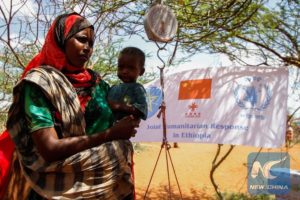Child malnutrition in Ethiopia has dropped 20 percent in 16 years
During a workshop in July 2017, UNICEF announced recent results stating that Ethiopia has reduced the rate of child malnutrition for children aged 6 to 23 months by 20 percent in sixteen years. The results, dropping from 58 percent in 2000 to 38 percent in 2016, represent significant progress in the fight against malnutrition for the nation.
During a workshop in July 2017, UNICEF announced recent results stating that Ethiopia has reduced the rate of child malnutrition for children aged 6 to 23 months by 20 percent in sixteen years. The results, dropping from 58 percent in 2000 to 38 percent in 2016, represent significant progress in the fight against malnutrition for the nation.
The revelation was made by UNICEF Ethiopia Representative Siddig Ibrahim during a three-day consultative workshop on complementary foods and feeding practices. According to him, Ethiopia is committed to further reducing stunting among children, which is a priority to ensure the well-being of children and sustained economic growth.
As these periods are crucial for the healthy growth of children, the government has been engaged in community mobilisation works through health and agriculture extension programs to reduce child malnutrition.”
Dr Ephrem Tekle, Director of Maternal and Child Health at the Ministry of Health.
Dr Ephrem Tekle, Director of Maternal and Child Health at the Ministry of Health, pointed out that monthly child malnutrition monitoring program and feeding children suffering from stunting is also one of the strategies that have been implemented to improve the complementary feeding practice throughout the country. He said that even though the country has attained results in feeding practices and complementary foods for children from 6-23 months, progress has so far been slow. According to Dr Ephrem, lack of coherence between the government and the partnership has partially contributed to lower results in improving children’s health.
Appreciating Ethiopia’s impressive gains, participants called for integrated efforts to address the root causes of under nutrition and an action plan is expected to be developed after the three-day workshop to harmonise the implementation of nutrition programs in Ethiopia.
Related links
- Apa News: Ethiopia cut child malnutrition by 20 percent – Unicef
- Ethiopian News Agency: Ethiopia Reduces Significantly Child Malnutrition for Children between 6 and 23 Months
- EBC: UNICEF commends Ethiopia’s effort to minimize under nutrition in children
- Xinhua Net: Ethiopia’s child malnutrition rate down by 20 percentage points in 16 years: UNICEF
Ethiopia makes major progress in reducing child malnutrition rate by 20 percentage points since 2000 https://t.co/AaYGRn7OcU pic.twitter.com/VeIAtSHhew
— China Xinhua News (@XHNews) July 20, 2017
